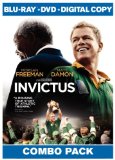| Reviews & Columns |
|
Reviews DVD TV on DVD Blu-ray 4K UHD International DVDs In Theaters Reviews by Studio Video Games Features Collector Series DVDs Easter Egg Database Interviews DVD Talk Radio Feature Articles Columns Anime Talk DVD Savant Horror DVDs The M.O.D. Squad Art House HD Talk Silent DVD
|
DVD Talk Forum |
|
|
| Resources |
|
DVD Price Search Customer Service #'s RCE Info Links |
|
Columns
|
|
|
Invictus
As of this writing, the 2010 World Cup in South Africa is less than three weeks from starting. The tagline that the main network broadcasting the tournament has been "One Game Changes Everything." No one would no more about it than the host country, whose people were on the brink of economic and societal conflicts unlike any other, when its leader supported for the hosting of the 1995 Rugby World Cup with the concept of sport transcending barriers among his people. Such is the inspiration for Invictus
Anthony Peckham (Sherlock Holmes) adapted John Carlin's book that Clint Eastwood (Gran Torino) directed. The film starts in 1990 with the release of Nelson Mandela (Morgan Freeman, (The Dark Knight) from prison. He is elected as South African President and when he takes office, he finds a country to raw from the decades-old policies of apartheid. Whites fully expect to receive ramifications of this and the blacks, now that they have assumed power in the country, are demanding payback.
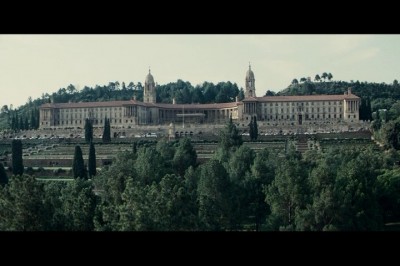
However Mandela does not stand for this. He feels that all of the people are needed to help rebuild South Africa, not just one race or another. As part of this campaign, he successfully secures the hosting of the Rugby World Cup and enlists the help of the South African team captain Francois Pienaar (Matt Damon, The Informant!). Pienaar's team has not been predicted to win or even contend for the title, but Mandela thinks that they potentially bring great benefit to the country. He even goes as far as making sure their logo (the Springbok, an antelope) is still represented on their jerseys during play, despite the opposition of his fellow blacks. His belief that they can help provide a measure of reconciliation to the country is admirable and powerful, particularly when the efforts begin to bear fruit.
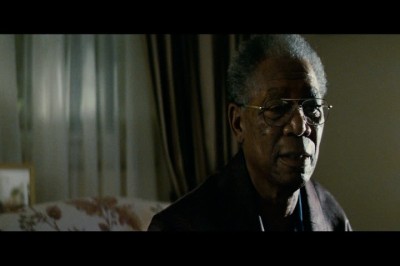
I come to Invictus after being inadvertently spoiled on the story by a couple of different sources; first by skimming Carlin's book and later watching the Freeman-produced documentary for the ESPN "30 in 30" series titled The 16th Man. So I knew what the end result of the story would be, which was fortunate because it gave me a chance to focus on some of the smaller more subtle aspects of the film. Chief among those was basking in Freeman's performance. Clearly, there is no one better suited to play Mandela, and Freeman inhabits the man so convincingly past the vocal inflections. He appears to possess the same perspective as Mandela did, and shows us that he has faults, much like Mandiba does. Through it all, the pains to get the vision realized, and the joys of seeing it occur are wonders to behold with Freeman's performance.
Damon's performance is a little more understated. As a man, Pienaar does not seem to have race and what the post-apartheid South Africa will look like; he plays rugby and leads his team in competition. He does seem to be quietly transformed by the experience, and in going to the townships and holding clinics for the black kids, and in eventually visiting Mandela's old cell on Robben Island, he becomes fully aware of what Mandela and others like him had to endure in order to see freedom. It enlightens him to what all of his compatriots went through, and he inhabits the stocky frame of a rugby player convincingly.
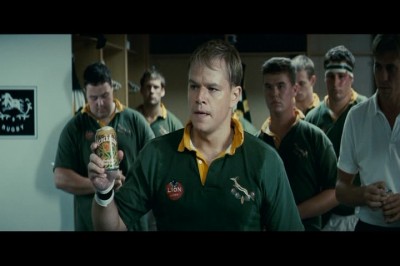
As for Eastwood, he shows us what the nation looked like when Mandela was released and the challenges he had to face, and does it well before letting the rugby story start to take place. When the rugby team's ascent takes hold, the film feels very conventional, disappointingly so. He puts you right in the middle of the scrums on the field and has you running with the players as they convert their tries, and to a novice of the sport, you get a solid feel for how physically demanding it is. However, he spends a little too much time on the pitch, particularly during the final match against the New Zealand All-Blacks. Additionally, the third act possesses many of the same mechanisms that other sports films employ. The nerves leading up to the final match and the hyping of how formidable an opponent is receive attention. There is even a small training montage of the team running (because you know, even Rocky had a montage). Considering Eastwood films have been well-crafted efforts for almost two decades, seeing these things in Invictus felt a little cheap to me.
Does this mean that Invictus should be avoided? Hardly. Freeman's performance alone makes the film worth watching. And Eastwood does a great job of letting a story speak for itself combined with excellent performance, and you are carried away by the emotional intensity and complexity of his films. But Invictus tries to oversell the story when it is perhaps not as robust as some of the other material he's done. It's good work, but it doesn't feel great. At least as part of Mandela's legacy, the tagline for this year's soccer World Cup shows us that we can be better than what society says we should, and that one game does change everything.
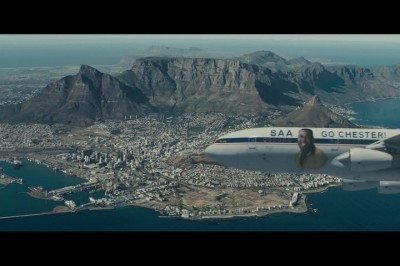
The Video:
The 2.40:1 widescreen presentation of Invictus uses the VC-1 codec and is a solidly faithful representation of the film. Tom Stern has been a crewmember on Eastwood films since Honkytonk Man and has been the Director of Photography for most of the Eastwood efforts of the last decade. He knows what Clint wants, and in this feature, the South African scenery gets as much of a chance to show off as the story does. Fine details in the Presidential offices or in the rugby stadiums can be made out easily, and the tighter shots possess a fine layer of film grain to let you know that it's still around as well. It's not going to blow you away and call itself reference quality, but Invictus is sharp and convincing on its own merits.
The Sound:The DTS-HD Master Audio track is also solid. You notice subtle directional effects like a door closing behind Pienaar in the rear channel at his meeting with Mandela, and dialogue stays well placed and balanced during the feature for that matter. But getting to the rugby sequences, the thud of the ball being kicked and the massive humanity that is a scrum both engage with subwoofer activity to help remind you of the power of the sport. The African music is allowed to shine in the third act and provides a warm level of comfort to the soundstage, and with Invictus, the overall result is pleasant to listen to.
Extras:Exclusive to the Blu-ray is "Vision, Courage and Honor," which is a Picture-in-Picture function where Eastwood, Damon, Freeman and many others discuss the film and their impressions of those involved in its story. Similar to the In-Movie Experience, you can scroll back and forth between segments if you like or turn it on/off, but it's a busy track during the film and full of information. After that, you have a section titled "Behind the Story," which is comprised of two parts. The first is "Mandela Meets Morgan" (28:10), which shows us the meeting of the two figures. Freeman shares his thoughts on Mandela and the cast share their opinions of Freeman's performance, and there's loads of film of the meetings the actors had. It slowly turns into a piece on the overall casting of the film, such as Damon for Pienaar and getting South African rugby players to fill out the Springboks. Those close to Mandela share their thoughts on Freeman's performance and on the film. Overall, it's a solid piece. "Matt Damon Plays Rugby" (6:49) is just that, as the actor talks about how he prepared for the physically demanding role and the real-life players talk about their thoughts on how Damon pulled it off.
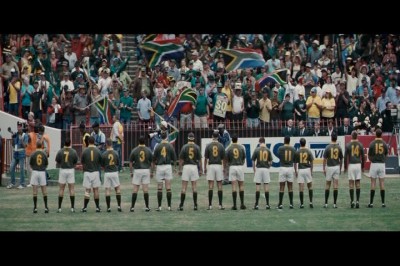
From there, "The Eastwood Factor" (22:23) is a portion of the Richard Schickel-produced appreciation of Eastwood's Warner Brothers tenure, as he recalls many of his films over the last several decades both by himself and in other locations on set with some of his longtime crew. As a taste of the documentary, it's very good. A trailer for the film's music is next (2:36), and as is the case with the Warner combo titles, the Blu-ray is on one disc while the standard definition and digital copy are housed on a second.
Final Thoughts:With an excellent performances by its co-stars, Invictus makes for compelling viewing for those unfamiliar with the story, even if the film itself might not be one of Eastwood's best. The technical qualities are very good and the supplements, while light, are worthy of perusal, but unless you're a superfan of the film, I would save your purchasing money for other titles.
|
| Popular Reviews |
| Sponsored Links |
|
|
| Sponsored Links |
|
|
| Release List | Reviews | Shop | Newsletter | Forum | DVD Giveaways | Blu-Ray | Advertise |
|
Copyright 2024 DVDTalk.com All Rights Reserved. Legal Info, Privacy Policy, Terms of Use,
Manage Preferences,
Your Privacy Choices | |||||||









